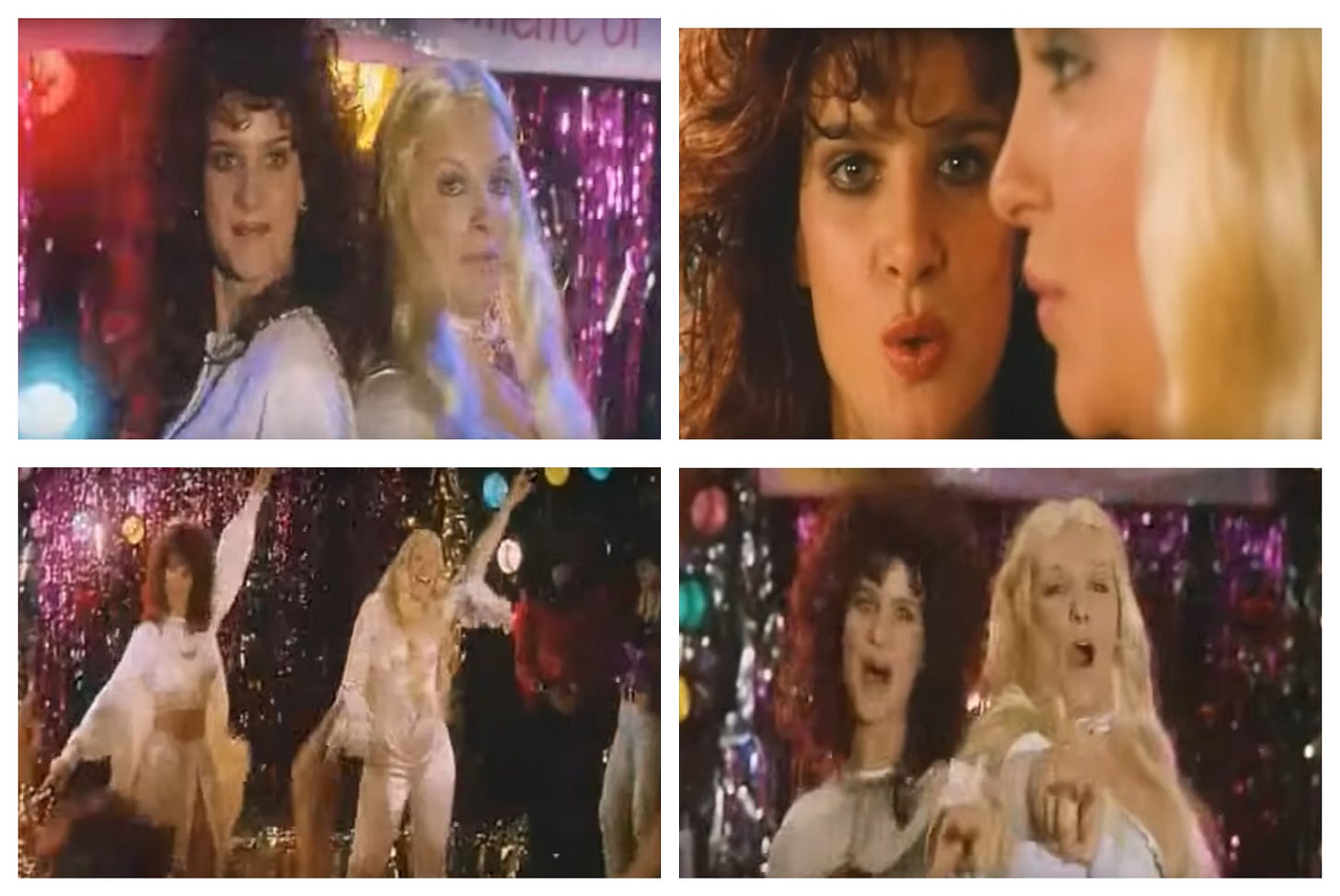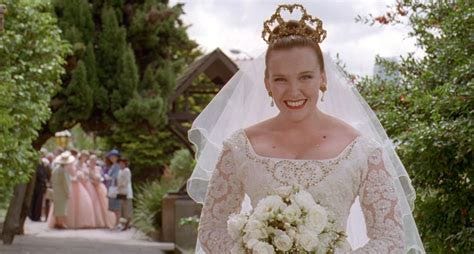The Weird and Wonderful MURIEL'S WEDDING is a Perfect Movie
This 1994 Australian film is on Netflix, and you should totally watch it. But is it really "feel-good"?
I love paeans to older movies I adore, because it’s fun reading a thousand or more words eloquently pointing out all the reasons why I’m absolutely right to love the movie the way I do.
I’m much less likely to read paeans to older movies I’ve never seen — and even less likely to finally watch the movie based on said paeans.
If I haven’t seen the film by now, I always think, how good can it be?
If you’ve never seen the 1994 Australian movie Muriel’s Wedding, I implore you to watch it now. It’s currently even available on Netflix.
Muriel’s Wedding is the story of a pathetic misfit named Muriel Heslop who, after a lifetime of dismissals from her father and friends, steals some money and sets out to achieve her secret long-time goal: to be married in a big and fabulous wedding.
Who she marries doesn’t matter, because it’s not about the guy or even the marriage. It’s about her being the bride in a wedding so big and fabulous that it will finally prove to everyone else — and, of course, herself — that she’s not a loser.
This whole movie is, in a word, bizarre. It has an anti-feminist must-get-married premise, but I think it’s a profoundly feminist film. It’s considered a “feel-good” movie, but it takes some incredibly dark turns. And it’s a comedy with a protagonist who, while sympathetic in some ways, can really only be called an anti-hero.
Muriel is selfish, shallow, self-deluded, and self-destructive.
But we somehow root for her anyway, mostly because she exists in a world of incredible cruelty. It’s shocking the way her father and friends belittle her.
Is this camp? It sometimes plays that way. But watch this scene to the end, to see the incredibly real way Muriel reacts to the way people dismiss her:
“I’m not nothing!” Muriel wails pathetically.
And, honestly, art doesn’t get any more truthful than this. In a very profound way, we are all Muriel. We’ve all either been her, or been terrified that we might become her.
The movie is sometimes over-the-top, but it’s never bizarre for the sake of being bizarre, and it’s the exact opposite of self-indulgent. Quirkiness and pretentiousness in film have become real pet-peeves of mine. Quirky, atmospheric directors like Sofia Coppola often leave me restless or outright bored, and the go-for-broke ones like Wes Anderson sometimes have me wanting to claw my eyes out.
I think: Can you PLEASE just tell the damn story?!
But Muriel’s Wedding is some of the surest, most solid storytelling I’ve ever seen.
Like most great tales, it’s both a universal story — of incredible yearning — but also the very specific story of one very strange person living in the fictional but utterly unique little backwater Australian town of Porpoise Spit.
Here are some of the reasons why this movie is cinematically important:
It was the breakout film for two very talented Australian actresses who would go on to have huge careers in America: Toni Collette (The Sixth Sense, The United States of Tara, Little Miss Sunshine) and Rachel Griffiths (Six Feet Under, Brothers & Sisters). Collette especially — then only 22 years old — gives an utterly bonkers but perfectly realized performance. Meanwhile, the film’s writer-director, P.J. Hogan, would go on to direct a fantastic American movie, My Best Friend’s Wedding, with Julia Roberts.
Muriel’s Wedding was released at a time when the Swedish pop band ABBA was considered extremely uncool. But this movie and its lead character’s weird love for the band helped ignite newfound affection for ABBA’s music, which was also featured in another 1994 Australian movie, The Adventures of Priscilla, Queen of the Desert. ABBA-mania would continue to grow throughout the 90s, culminating in the dazzling West End and Broadway musical Mamma Mia! that would eventually become a world-wide phenomenon with a series of hit movies.
The movie was part of an extremely interesting wave of mid-90s Australian “crowd-pleaser” films that openly mixed comedy and pathos: in addition to The Adventures of Priscilla, Queen of the Desert, other such films included Strictly Ballroom and Shine.
But I’m not sure I would have re-watched Muriel’s Wedding if Michael and I weren’t living in Australia right now. I remember seeing the film when it was released in the 90s and loving it, but I remembered it as an outright comedy — a “feel-good” movie.
And it is funny at times. The film’s most famous scene is when Muriel and her new free-spirit friend Rhonda shock their old high school friends at a nightclub by appearing on stage to lip-sync an extremely exuberant rendition of the ABBA song “Waterloo.”
And, of course, the movie includes lots of wonderful catch-phrases and sight gags.
Every time Muriel is caught in another crime, her even-more-hapless sister gives her a sly smile and says, “You’re terrible, Muriel.” Naturally, that’s now a popular GIF.
And after Muriel’s friends reject her, and she pathetically follows them on vacation, one of them confronts her and says, “You’ve got no dignity, Muriel!” — despite the friend being decked out in her own less-than-dignified costume.
These are laugh-out-loud moments.
But I was truly shocked by how dark this movie goes, which I somehow didn’t remember. Cancer? Suicide?
I couldn’t help but ask myself: Why the hell does everyone think of this as a “feel-good” movie?
I think the answer is how it is sometimes over-the-top. But I think it’s also because of the realism: how invested we become in Muriel’s story, and how it’s such a strong one.
We take this story seriously. We really, really want Muriel to succeed, and when she does, we feel, well, good.
But, of course, like all compelling stories, Muriel’s is not obvious.
When we first meet Muriel, she’s a confused misfit.
Then she meets free-spirited Rhonda, who accepts Muriel for exactly who she is, but also tells her she really can have a life of freedom and independence.
Later, after Muriel finally starts to build that life, she tells Rhonda: "When I lived in Porpoise Spit, I'd just stay in my room for hours and listen to ABBA songs. Sometimes I'd stay in there all day. But since I've met you and moved to Sydney, I haven't listened to one ABBA song. It's because now my life's as good as an ABBA song. It’s as good as ‘Dancing Queen.’”
Which, come on, is amazing dialogue — incredibly specific to the character, but also capturing another profound universal truth.
Before long, Muriel also has a chance to have that incredible wedding she’s always dreamed of, to a handsome and famous South African swimmer who needs Australian residency to compete in the Olympics. It won’t be a real wedding, but Muriel has never cared about that anyway. She just wants to finally be the center of attention — and to also impress her father and her childhood friends.
Unfortunately, Rhonda has had an accident, and she needs Muriel’s help. But Muriel can’t help Rhonda and live with her fake new husband the required four months before they’ve agreed to divorce.
So which does she choose?
I’m a believer in the adage that says that the key to successful writing is to make your audience want something really, really badly…and then give it to them! Except not at all in the way they expect.
And the more the audience wants it, and the more unexpected the ending, the more the audience will love you — and the more they’ll call your movie “feel-good,” even if it includes things like cancer and suicide.
So does Muriel get her fabulous wedding?
Well, kind of. And in a way, it really does make all her dreams come true.
But sometimes what we need is not the same as what we think we want, which is why Muriel’s ultimate union is not the one she — or we — expect. Then again, this clever plot-two-step is, frankly, why we’re still talking about this gem of a movie almost thirty years after it was released.
Now I’ve come to the end of my own thousand+ word film paean, and I fear I’ve already said too much.
If you’ve already seen Muriel’s Wedding, watch it again. If you’ve never seen it, watch it now.
See that girl, watch that scene. I strongly suspect you’ll very much dig this dancing queen.
Brent Hartinger is a screenwriter and author. Check out his other newsletter about his travels at BrentAndMichaelAreGoingPlaces.com.







Beautiful write up, Brent. You captured it all perfectly. It brought back memories of watching it back in the day. I even vaguely recall having to write an essay on it for English!
I remember seeing Muriel’s Wedding at the cinema. It marked, as you say Brent, an Australian film renaissance and of Australians heading back to the movies after many years of staying home and watching movies on the VCR. Thank you for the reminder!